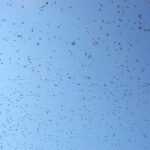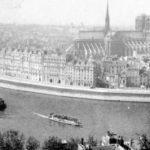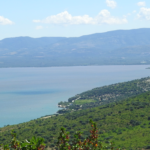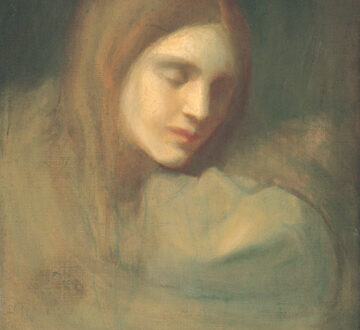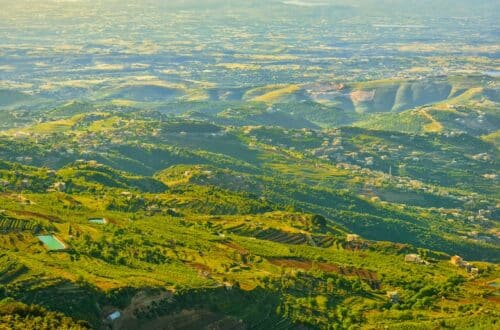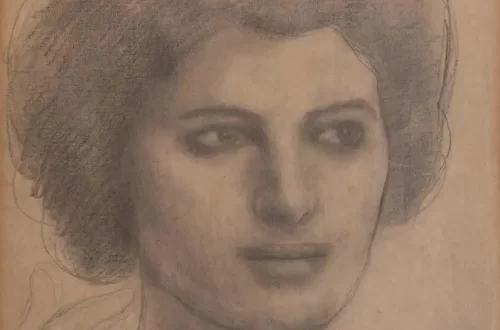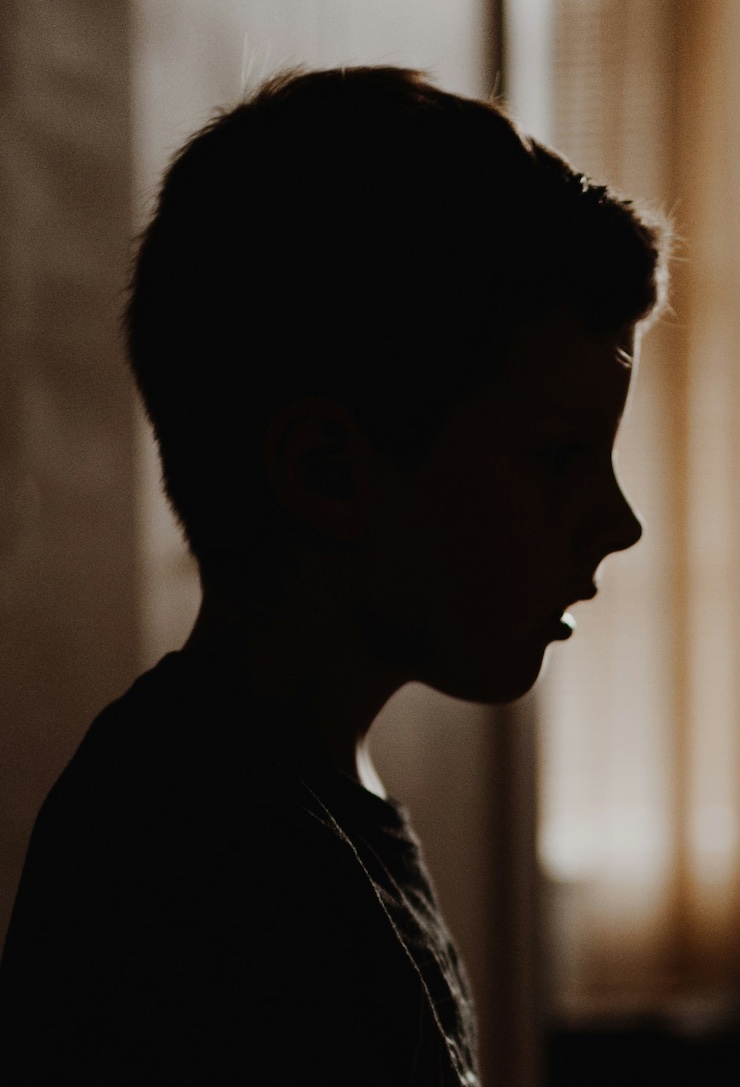
Darkness and Light: May Ziadeh and the Child’s Destiny
May Ziadeh’s poetry is evocative and striking. Her poem “The Child and I” is a notable example, and has a particular poignancy. The poem, which first appeared in her collection Darkness and Light 1923 (ظلمات وأشعة), tells the story of a conversation between a small English boy and an Egyptian or Arab woman. The poem was perhaps inspired by May Ziadeh’s thoughts during a real interaction, as it is told in first person. It occurs near the Nile, and we must imagine the encounter occurring at sometime in the 1910s or 1920s, when the British were the colonial power in Egypt.
As we shall see, the poem begins with specifics like these. However, as the poem proceeds the specifics become enwrapped in larger universals.
Here the poem is presented in May Ziadeh’s Arabic original, with my English translation.
The Child and I
أنا والطفل
Far from the hubbub of the city, on the road which leads to the old abandoned palace of Khedive Ismail by the riverbank sacred to the ancient Egyptians where once there was a nursery to Isis, by the riverbank where the Nile weeps on her journey over the scattered and pure remains in its depths; there you find a wonderful meadow, a garden open to all who wish to visit. And its air preserves the dreams and contemplations of its visitors.
هناك بعيدًا عن المدينة وضوضائها، في الطريق المؤدية إلى قصر كان بالأمس للخديوي إسماعيل ولم يعد له، على شط معبود المصريين ومرضع سهول إيزيس، على شط النيل النائح في سيره على رفات العذارى المبعثر في أعماقه؛ هناك روضة غنَّاء مفتوحة لجميع الداخلين، وقد حفظ جوها أحلام زائريها المتأملين.
I set out for that garden one brilliant morning and once there, abandoning the habits of the city, I stretched out on the earth like a Bedouin who stretches themselves on the sand of the desert. And there I rested on green grass, in the shade of a bush, and at my feet stood a statue.
قصدت إلى الحديقة في صباح يوم منير. نبذت عني عادات المدنية فافترشت الثرى كما يفترش سكان البادية رمال الصحراء، وتمددت على العشب الأخضر في فيء شجيرة عند قدمي أحد التماثيل المنصوبة هنالك.
No one did I see, save two English ladies, one of whom had three children. Only a little while had passed before one of the children approached me, and he was a little boy of four, so I called out to him. “Come to me, little one.”
لم أرَ حولي سوى سيدتين إنجليزيتين مع إحداهما ثلاثة أطفال، وإن هي إلا دقائق حتى اقترب مني أحد هؤلاء، وهو صبي في الرابعة من سنواته، فناديته قائلة: «تعالَ إليَّ أيها الصغير!»
So he came, smiling shyly. And I said to him: “Won’t you sit on my lap?” So he sat, and did not say a word.
فدنا واجفًا باسمًا، فسألته: «ألا تجلس على ركبتي؟» فجلس صامتًا.
And when I felt the weight of his little body, it reminded me of my only brother, who had died, and my heart leapt to my mouth; and tears welled between my lashes, so I leaned towards him absorbing the sweetness of his cheek, and unawares, his kiss brought relief from the melancholy which rises in my heart, as the clouds rise from the horizon of the sea.
ولما شعرتُ بثقل جسده الصغير ذكرت أخي الوحيد الميت، ووثب قلبي إلى شفتيَّ، وجالت الدموع بين أجفاني، فمِلْتُ إلى الطفل امتص من حلاوة وجنته، لاهية بتلك القبلة عن كآبتي المتصاعدة من فؤادي كما يتصاعد الغيم من أطراف البحار.
How sweet the kisses of children! How enchanting their smiles!
ما أعذب قبلة الأطفال! وما أطيب طعم ابتسامهم!
I asked the boy: “What is your name?”
ثم سألت الطفل: «ما اسمك؟»
“Robert,” he said.
قال: «روبرت.»
I gazed at his face: a jewel among jewels of English beauty. His face radiant, as if the essence of rose and jasmine had been sculpted and given form in his human visage. His lips, shy, like floating rosebuds, his forehead high and wide, hidden by his tumbling golden hair, and his eyes, a blue deep as the blue of the sea at twilight; like those steady English eyes with their hidden warmth and playful sweetness. All those features, I took them in, absorbing them, and I said to him: “Where do your eyes come from, Robert? And who gave them their blue?”
نظرت في وجهه فإذا به آية من آيات الجمال الإنجليزي: وجه شفاف كأنما هو عصير ورد وياسمين تجمَّد فنُحِتَ وجهًا بشريًّا، وفم كزرِّ الورد لطفًا وانكماشًا، وجبهة كبيرة عالية يخفيها شعر ذهبي مسدول عليها، وعينان لهما زرقة عميقة كزرقة البحار بعيد الغروب، وهما كبعض العيون الإنجليزية في جمودهما الظاهري، وحرارتهما الخفية، وحلاوتهما وتلاعبهما. نظرت في جميع هذه الملامح متمعنة، فقلت للطفل: «من أين أتيت بعينيك، يا روبرت؟ ومَن أعطاك زرقتهما؟»
But he only understood “From whom” and replied: “Mamma”.
أجاب، ولم يفهم غير كلمتي «من أعطاك»: «ماما.»
I said: “You are the apple of your mother’s eyes, Robert! And what does your father do?”
قلت: «قرَّت عينا أُمِّك بك! وأي عمل يعمل أبوك؟»
He replied, his sweet words faltering on his child’s lips: “Papa is an officer, and I am a soldier like Papa.”
قال ولثغاته اللطيفة تتدحرج على لسانه متعثرة بشفتيه: «بابا ضابط، وأنا عسكري مثل بابا.»
I said: “You are beautiful, and I love you Robert. Show me your hand.”
قلت: «أنت جميل، وأنا أحبك يا روبرت. هات يدك.»
He said: “Yes, Thank you.”
Yes, Thank you. قال:
A child’s hand is a sweet wonder, like their smile. I took Robert’s hand and read what was written on it of his destiny: a square hand with a large thumb. All the lines were there: of life, of mind and heart, clear and evident, and the Mount of Mars rose in that little palm: like a threat, like a promise …
يد الأطفال عجيبة حلوة كابتسامتهم. أخذت يد روبرت أقرأ فيها ما خطته يد الأقدار: يد مربعة كبيرة الإبهام، وفيها كلٌّ من خطوط الحياة والعقل والقلب واضح جلي، وتلُّ المريخ يرتفع في تلك الكف الصغيرة متهددًا متواعدًا …
So I looked at him and whispered: “… This little hand, with its lines of destiny written by angels, which now only stretches out to touch the dew and the flower, this hand will become the hand of a soldier, it will take hold of the sword and the spear, and launch fire from the mouths of cannons, it will annihilate the lives of men, be they evil or be they good …!”
فنظرت إليه وخاطبته همسًا: «هذه اليد التي تنقل إشاراتها اليوم ما حفظته من إشارات الملائكة. هذه اليد التي لا تمتد إلا لمداعبة الندى ولمس الأزاهير. هذه اليد الصغيرة الطرية سوف تصير يد جندي، سوف تقبض على السيف والحربة، وتطلق النيران من أفواه المدافع، سوف تفتك بحياة البشر أشرارًا كانوا أم أبرارًا …!»
Robert said, as he beat his feet on the soil of the garden: “Am I a soldier like Papa?”
قال روبرت وهو يضرب أديم الحديقة بقدميه: «أنا عسكري مثل بابا؟»
I said: ‘Yes, Robert, when you reach the age of conscription, you will become a soldier, and you will be handsome in your soldier’s uniform. You will be very handsome, but less beautiful than you are today in your child’s outfit. Women will smile at you because they are attracted to soldiers, with their gilded sleeves and your beauty will easily take them to the world of their dreams. This small frail hand will grow and become powerful: able to hurt, able to inflict pain, able to kill. With steady determination, it will take hold of the instruments of destruction and ruin. And your beautiful eyes will become the eyes of an executioner. Without mercy, they will gaze down on blood and tears, without compassion … and your heart – you will see that your heart will become something that today it barely feels and scarcely knows …”
قلت: «نعم يا روبرت، عندما تبلغ سن التجنُّد تصبح جنديًّا، وستكون جميلًا في ثوبك العسكري، ستكون جميلًا جدًّا، لكن أقل جمالًا منك اليوم وأنت بأثواب الطفولة. سوف تبسم لك النساء لأنهن يَمِلنَ إلى الجنود، ومُذهَّبُ الأكمام والصدور يسير بهنَّ إلى عالم الأحلام. وهذه اليد الصغيرة الضعيفة سوف تكون كبيرة قادرة تؤلم وتُشقي وتُميت، سوف تلمس آلات التدمير والهلاك بعزم وثبات! وعيناك الجميلتان سوف تكونان عيني جلاد يرى الدماء والدموع دون أن يلين أو يرحم … وقلبك، ترى كيف يكون قلبك الذي لا يدرك اليوم ولا يشعر إلا قليلًا …؟
Will you be like those who pay no heed to their feelings in life; they play and laugh, rejoicing or lamenting without any lasting mark when they are put to the test; nay for whom the joy and sorrow of their soul is like a rain of tears on a clear glass which vanishes with the breeze … or will you be one of those who are overwhelmed in their loneliness, but pretend the opposite, appearing prideful and arrogant? … Will a woman’s hand strike you one day, so that tears of love spring in your eyes, and your heart is pierced with despair as if she had plunged in it a dagger?
أتكون من الكثيرين الذين لا يحسبون للعواطف في الحياة حسابًا، فيلعبون ويضحكون ويتمتعون ويحزنون دون استبقاء أثر لما يختبرون، بل تمرُّ الأفراح والأتراح على نفوسهم كما تسقط دموع الغيوم على صفحة الزجاج فلا تترك عليها سوى ما لا يلبث أن يزول … أم تكون من أولئك الذين يشعرون بقوة وحدَّةٍ، ويتظاهرون بعكس ذلك كبرًا وخجلًا؟ … هل تضربك يومًا يد امرأة فتضع في عينيك للحب دموعًا، وتغمد في فؤادك من اليأس خنجرًا؟
Tomorrow, Robert, your body and spirit will grow. Tomorrow, you will become a man, and you will find yourself alone on the battlefield of life. Tomorrow, your duties will torment you, and your struggles exhaust you, and the fire of your thoughts will sear you, and passion will overcome you. Tomorrow, your soul with hunger. Tomorrow, you will become a man. O the horror of the word. Tomorrow, you will become a man; that is both beast and angel in one! ….” Then, for a long time, I fell silent.
«غدًا، يا روبرت، تنمو جسدًا ونفسًا، غدًا تقف على أحوال البشر، فتجد ذاتك وحيدًا في معترك الحياة، غدًا تعذبك المسئولية، وتُضنيك المجاهدة، ويلذعك لهيب الفكر، وتذيبك نار الهيام. غدًا تذوق ظمأ الروح، غدًا تصير إنسانًا. يا لهول الكلمة! غدًا تصير إنسانًا؛ أي حيوانًا وإلهًا معًا! …» صمتُّ طويلًا.
And while in the total peace of that embrace, a sweet song rose from the edge of the garden, and spread like a breath of fragrance, and it was the Muezzin’s call to prayer, repeating at midday its song from the morning, and the song which would return at twilight.
وفي ذلك الهدوء الشامل في حضن الطبيعة تصاعدت نغمة حلوة من أطراف الحديقة، وانتشر تموجها على أنفاس الأزهار، وكان ذلك صوت المؤذن يردد في الظهيرة ما أنشده في الفجر وما سيعيده عند الغروب.
So I asked him: “Do you hear that song, Robert?”
فسألت: «هل سمعت الصوت، يا روبرت؟»
“Yes,” he replied.
Yes :أجاب
I said: “Soon you will know what myths are, and what Christianity, and Islam are. Soon you will know fanaticism of religion, and race, and science and tribe and self. Soon, you will learn that from the silk worn by the bride on the day of her wedding, is fashioned the shroud for the dead. Soon you will see clan killing clan because each is gathered together under a dyed cloth; because the colour of the cloth of one is different to that of the other. Soon you will see all these things Robert, and you will have a hand in them, because you are a soldier like Papa.”
قلت: «عما قريب تعرف ما هي الميثولوجية، وما هي النصرانية، وما هو الإسلام، عما قريب تفهم ما هو التعصب الديني والجنسي والعلمي والعائلي والفردي، عما قريب تعلم أن الأنسجة التي تخاط منها أثواب العرس تصنع منها أكفان الشهداء، عما قريب ترى الأقوام يفتكون بالأقوام لأنهم محتشدون حول قطعة نسيج صبغت بلون غير لون نسيجهم، عما قريب ترى كل هذا، يا روبرت، وتشترك فيه؛ لأنك عسكري مثل بابا!»
•••
I rose and parted from Robert without a kiss and without farewell. I didn’t kiss him because I was afraid of the man he would become tomorrow. And he didn’t kiss me, because I had given him neither sweets nor cake …”
Translated by Michael Curtotti
انفصلت عن روبرت بلا قبلة ولا تحية. أنا لم أقبِّله لأني وقفت متهيبة أمام رجل الغد منه، وهو لم يقبِّلني لأني لم أعطه كعكًا ولا حلواء …
by May Ziadeh
Image



